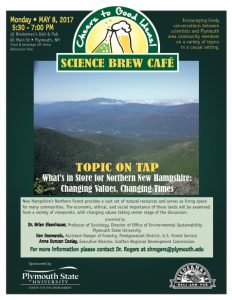By: Roy Fruit, M.S. Candidate ES&P
As described by the organization sciencecafes.org, science cafés can be defined as “events taking place in casual settings such as pubs and coffeehouses,” that are “open to everyone, and feature an engaging conversation with a scientist about a particular topic.” These social gatherings arose from a grassroots movement to bridge the gap between scientists and the general populace. As we’ve discussed in our Environmental Ethics course this semester, we as scientists cannot deny this inherent disconnect. Coming from a small town in Ohio, I can testify to the gap between these two worlds. To many blue-collar families and individuals, academia and science itself represent a kind of elitism, a world in which they cannot relate (and are not welcome.) Let’s face it: who among us has not wagged our finger at those questioning the theory of evolution, or thought (or referred to) those denying climate change as fools? I believe it is because of this attitude we can attribute some of our nation’s grander problems; specifically, the lowering rates of literacy and interest we are facing among our youth in mathematics and science. How can we get the future leaders of our society excited about science when those closest to them regard it as at best unattainable and at worst as a fallacy?
On the opposite end of the spectrum, it should also be mentioned that many scientists find themselves in a difficult position when it comes to communicating information with the public. Not only are many of us untrained in leading public engagement, but also face pushback on lobbying for and advocating our findings and methodology (both from the public and our institutions.) Luckily, the idea of a science café is just what the conflict resolutions specialist ordered! Through informal discussions in settings where we can all relax, science can cross any boundary. Reading up on a topic of interest, testing a new recipe for dinner, approaching fixing that leaky faucet several ways, these are all examples of how many people use science everyday without even realizing it!
Those of us with the privilege of a scientific education should also be aware of another beneficial outcome of the science café: hearing perspectives outside of our own bubble. While an education in the sciences can undoubtedly prepare us for many of the challenges and problem solving situations in which we may find ourselves, local knowledge (be it passed through generations or picked up through happenstance) is an undeniably important piece of the greater puzzle.
I’d therefore like to invite you all to our local science café, “What’s in Store for Northern New Hampshire: Changing Values, Changing Times.” Hosted by the Environmental Science and Policy graduate course “Environmental Ethics” under Dr. Shannon Rogers, scientific experts and community members will discuss the economic, ethical, and social importance of New Hampshire’s Northern Forest. This includes the vast natural resources and living space it provides, with changing values of the region taking center stage of the discussion. Panel members will include Dr. Brian Eisenhauer, a professor of sociology at PSU and Director of the Office of Environmental Sustainability; Ken Desmarais, an assistant ranger of forestry for the Pemigewasset District of the U.S. Forest Service; and Anne Duncan Cooley, Executive Director of the Grafton Regional Development Commission. The event will be held at Biederman’s Deli & Pub in downtown Plymouth on Monday, May 8th, from 5:30 to 7:00 p.m. Admission is free for everyone, with food and beverage available for purchase. So come out, grab a beer, grab a bite, and grab some knowledge!

